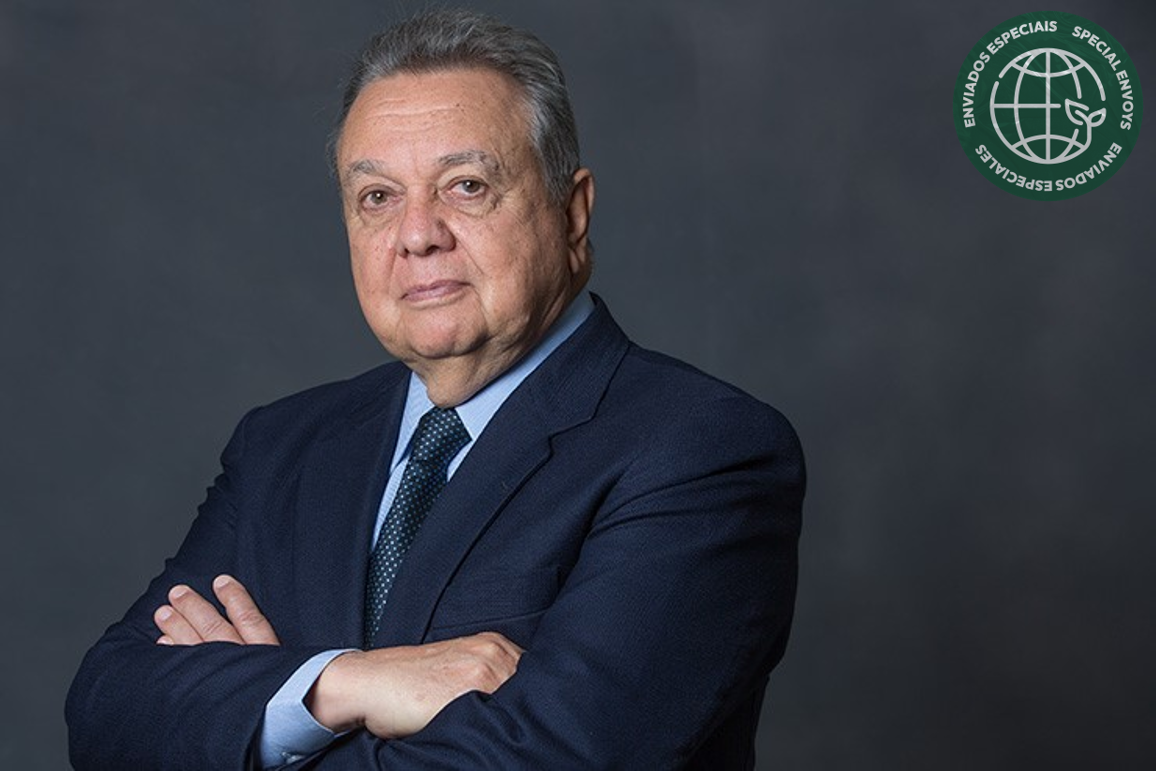COP30 will be an opportunity to showcase Brazil’s sustainable tropical agriculture to the world, says Special Envoy
Former Agriculture Minister Roberto Rodrigues also notes that the Brazilian model can be replicated in other countries with similar climates

By Rafaela Ferreira / COP30
Agriculture brings together a strategic set of solutions to confront climate change while promoting peace and collective well-being. That is the view of Roberto Rodrigues, Special Envoy to COP30 with a focus on agriculture. In this episode of the Special Envoys Series, the former Minister of Agriculture (2003–2006) highlights the role of tropical agriculture, which merges technology and sustainability to help address climate challenges.
Regarding his role as Special Envoy, Rodrigues emphasizes that although COP30 will not focus specifically on agriculture but rather on climate, the conference in Belém presents a major opportunity. “It is a tremendous honor to represent the sector at an event of this magnitude. Even though it is not an agriculture-focused COP, it will take place in Brazil—and the entire world will be watching. We have a unique chance to showcase Brazil’s tropical agriculture, which is both sustainable and replicable in other countries with similar climates. This is the vision of Ambassador André Corrêa do Lago, which I have also come to share.”
“My mission will be precisely that: to show the world the efficiency and replicability of Brazilian tropical agribusiness,” the former minister says.
The Special Envoy for Agriculture also revealed that a new publication will be released in October highlighting the past 50 years of Brazilian agribusiness. It will present key data and historical insights into the sector. “The document shows how technology and science have enabled Brazil to make an extraordinary leap in sustainable tropical production. It encompasses all productive activities—grains, proteins, and bioenergy,” he explains.
Tropical Agriculture
According to Embrapa, the Brazilian Agricultural Research Corporation, tropical agriculture—unlike agriculture in temperate zones—benefits from constant sunlight and warmth throughout the year, allowing for multiple cropping cycles and high productivity. However, tropical soils tend to be highly weathered, acidic, and rich in aluminum—conditions that demand innovative farming techniques and locally adapted evaluation models.
Rodrigues notes that Brazil’s ability to produce efficiently under tropical conditions stems from decades of national scientific research that developed crop varieties, management practices, and soil correction techniques suited to these environments. He emphasizes that tropical agriculture must be placed at the center of international negotiations. “My ambition—my vision—is that this COP in Brazil will allow us to show the world that tropical agriculture is truly sustainable,” he says.
He adds that the goal is to invite the entire tropical world to engage with the technologies developed in Brazil. “There must be at least two key areas of global cooperation. First, financing—since not all countries have the resources to develop tropical technologies at the level we have achieved. Second, trade rules must become more flexible, because under the current system, shaped by developed countries, it is very difficult for a nation to start from scratch and enter production without a fairer, more equitable global trading environment,” he explains.
“We need to show the world that what has been achieved here is entirely possible in other tropical countries, so that the tropical world can take responsibility for what I call the four modern horsemen of the apocalypse: food security, energy transition, social inequality, and climate change. I am convinced that the tropical world will be the one to solve these challenges and, in doing so, ensure global peace. It is a project in pursuit of universal peace,” says Rodrigues.
Agriculture and Renewable Energy
In Brazil, bioenergy production from sugarcane plays a crucial role in decarbonizing the energy and transportation sectors. “Sugarcane ethanol emits only 9 percent of the CO₂ released by gasoline. It is, therefore, a carbon-sequestering industry. Soy biodiesel emits just 19 percent of the CO₂ produced by petroleum diesel. Today, Brazil has 10 million hectares of planted forests, which also capture carbon,” the Special Envoy explains.
In 2024, President Luiz Inácio Lula da Silva signed the Future Fuel Law, a landmark measure introducing initiatives to promote low-carbon, sustainable mobility and strengthen Brazil’s position as a global leader in the energy transition. The legislation establishes national programs for green diesel, sustainable aviation fuel, and biomethane, while also increasing the proportion of ethanol in gasoline and biodiesel in diesel.
The law also creates a regulatory framework for carbon capture and storage, unlocking R$ 260 billion in investments and generating opportunities that combine economic growth with job creation and environmental responsibility. This framework marks a major step forward in the fight against climate change. Under the Future Fuel initiative, Brazil is expected to avoid the emission of 705 million tons of carbon dioxide (CO₂) by 2037—reinforcing the country’s commitment to reducing greenhouse gas emissions.
Translation: Michel Emmanuel Félix François (POET/UFC)
Proofreading : Tadeu Azevedo (POET/UFC)
